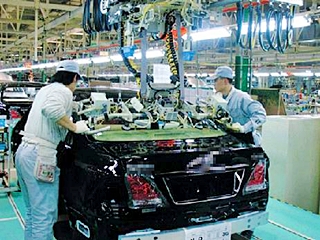BANGKOK, Feb 29 – A Japanese conducted survey of sentiments regarding Japanese joint ventures in Thailand sees an improving business outlook in the first half of 2012, Bangkok-based Setsuo Luchi, president of the Japan External Trade Organisation (JETRO) told a news conference Tuesday.
According to the survey of 1,345 companies, in which 366 responded, about 64 per cent of the responding Japanese companies see the overall business condition improving, while 18 per cent thought otherwise. The survey results projected that all industrial sectors except textiles will move into a better direction.

Regarding total sales outlook in 2012, 76 per cent of Japanese companies expected increased sales, said the survey by the Japanese Chamber of Commerce Bangkok (JCCB), Japanese entrepreneurs have invested more in production, improving factories and purchasing new machines after last year’s flooding.
Export markets also look promising. Japanese companies said on average that 46 per cent of their products were bound for Japan, followed by Indonesia, India and Vietnam. Moreover, Myanmar is an emerging and promising market.
This year the procurement of parts and raw materials in member countries of the 10-nation Association of Southeast Asian Nations (ASEAN) is expected to rise to 57 per cent.
Most Japanese businesspersons called on the Thai government to ensure political stability and national security. In addition, they also want Thailand’s current customs and tariff system to be revamped. About 83 per cent of those surveyed urged the government’s reinsurance system to take shape and to quickly put into action a fast response flood-prevention plan.
Regarding the ongoing impacts from Thailand’s devastating flood, 78 per cent of Japanese companies have been affected indirectly due to business disruption of their trade partners and raw materials suppliers.
About 85 per cent of flood-affected businesses did not relocate their plants, but eight per cent of electrical and electronics businesses have shifted their plants to Malaysia, Indonesia and Vietnam.
Concerning an increase in the daily minimum wage to 300 baht, the majority, some 63 per cent of Japanese manufacturers said the measure deals a heavy blow to their businesses, mainly production industries.
To cope with the problem, they said they would voluntarily opt to utilise more automated systems, while other options include reducing manpower and increasing their prices.




